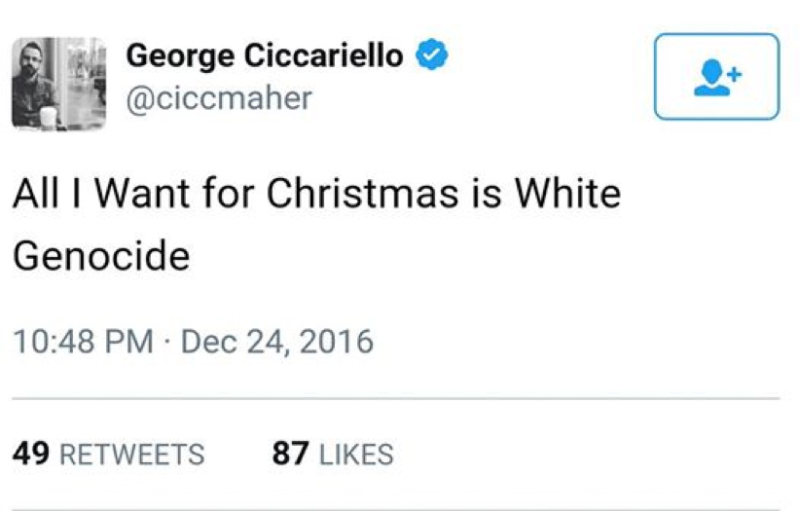Looking into Tweets
Colleen Flaherty, Inside Higher Ed, April 18, 2017

Drexel University is moving forward with an investigation into a professor’s controversial tweets, and it’s unclear what, if any, backing the inquiry has from the faculty.
George Ciccariello-Maher, an associate professor of politics and global studies at Drexel, is the professor who tweeted on Christmas Eve (academically tongue-in-cheek, he’s since said) that all he wanted for the holiday was “white genocide.”
More recently, Ciccariello-Maher tweeted that he wanted to “vomit” after seeing someone give up a first-class airline seat to a uniformed soldier.
{snip}
What’s certain is that his Twitter feed (now private) is becoming a test case for academic freedom — as evidenced by letters to the professor from his provost, obtained by Inside Higher Ed from a third party.
In the most recent letter, dated April 3, M. Brian Blake, provost, informed Ciccariello-Maher that his “behavior has left me with no choice but to ensure that an appropriate review is conducted in order to deal with this serious distraction to the important academic mission of the university.”
{snip}
The provost said that Ciccariello-Maher’s conduct is “even more concerning” because he previously sent a “cautionary letter” about the professor’s social media activity after his “white genocide” tweet. Blake in that letter, dated Feb. 2, expressed concerns about two other tweets on the professor’s feed going back to 2015:
- “#BringBackFields, then do him like #OldYeller,” which, in Blake’s words, “many interpreted to mean that you called for the murder of Ben Fields, the South Carolina deputy school resource officer who violently arrested a female high school student.”
- “Off the Pigs,” which Blake said “many interpreted as your advocating for the murder of police officers.”
Blake cited Drexel’s academic freedom policy, noting that it’s derived from guidelines from the American Association of University Professors.
{snip}
“The college or university teacher is a citizen, a member of a learned profession and an officer of an educational institution. When s/he speaks or writes as a citizen, s/he should be free from institutional censorship or discipline, but his/her special position in the community imposes special obligations,” the policy says. “As a people of learning and an educational officer, s/he should remember that the public may judge his/her profession and his/her institution by his/her utterances. Hence, s/he should at all times be accurate, should exercise appropriate restraint, should show respect for the opinion of others and should make every effort to indicate that s/he is not an institutional spokesperson.”
{snip}
Over the past 16 months, Blake added, “the university has been faced with heightened concerns for community safety, received significant negative feedback and has unfortunately spent considerable time and resources as a result of your statements on Twitter.”
{snip}
“Numerous prospective students whom the university has admitted have written to the university stating that they will not attend the university because of your conduct, and at least two potential significant donors to the university have withheld previously promised donations,” Blake said. “The nearly unmanageable volume of venomous calls that the university has received — during this critical time in the academic year when prospective students are deciding where they want to attend college — compelled the university to consider turning off its phones in the days following your tweet, and we have real concerns that admitted students were unable to get through with questions.”
Blake added, “Despite my efforts to engage in a constructive dialogue with you in the hopes of making you more self-aware of the consequences of your actions, your course of conduct suggests to me that you are unable or unwilling to calibrate your actions to consider the damages that they cause to your university and all those who work so hard to advance the mission of the university.”
{snip}
As for what, exactly, the university will investigate, Blake in his April letter said that “in light of the serious damage to the university and its reputation that your provocative tweets have caused, it is imperative to determine whether you have violated the university’s Code of Conduct and/or other policies and whether your tweets are a violation of the special obligation that a faculty member has under Drexel’s academic freedom policy.”
{snip}
Ciccariello-Maher is far from the first professor to face administrative scrutiny of his social media activity.
A review of recent cases suggests those professors with tenure fare better than assistant professors or untenured lecturers and adjuncts. One notable exception was Saida Grundy, an assistant professor of sociology at Boston University whose tweets about race led to calls for her dismissal; her cause was helped by sociologists rushing to defend her, arguing that some of her comments about white people were grounded in sociological research. Another untenured professor at the University of Wisconsin at Madison also faced public furor over tweets about police, but the administration has thus far backed Damon Sajnani, assistant professor of African cultural studies. At the same time, Ciccariello-Maher’s case differs from others, because he continued to post controversial tweets even after he was warned not to.















